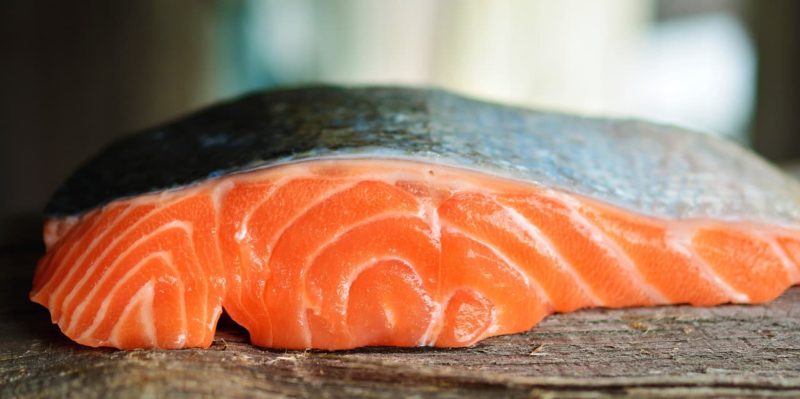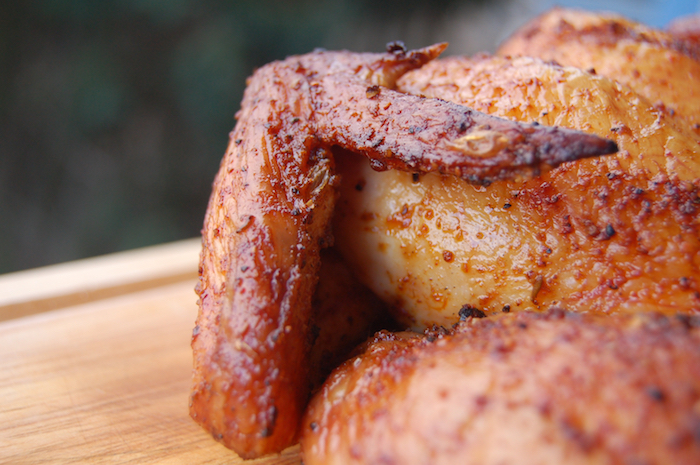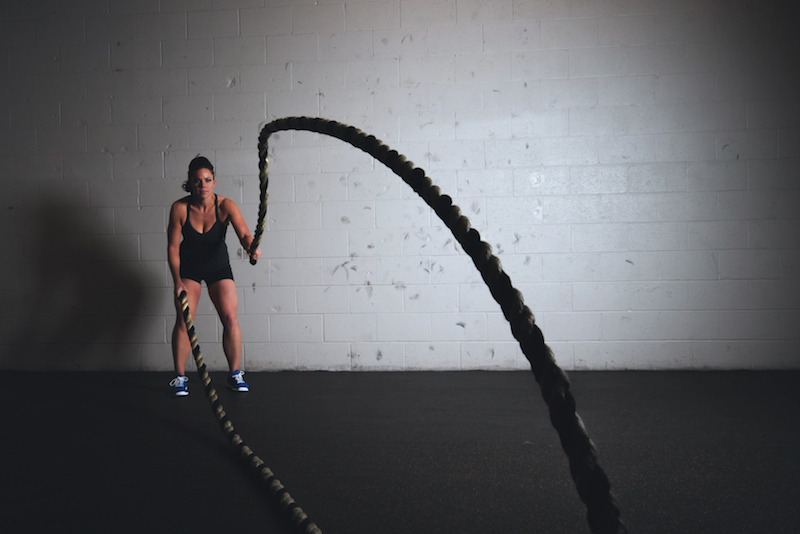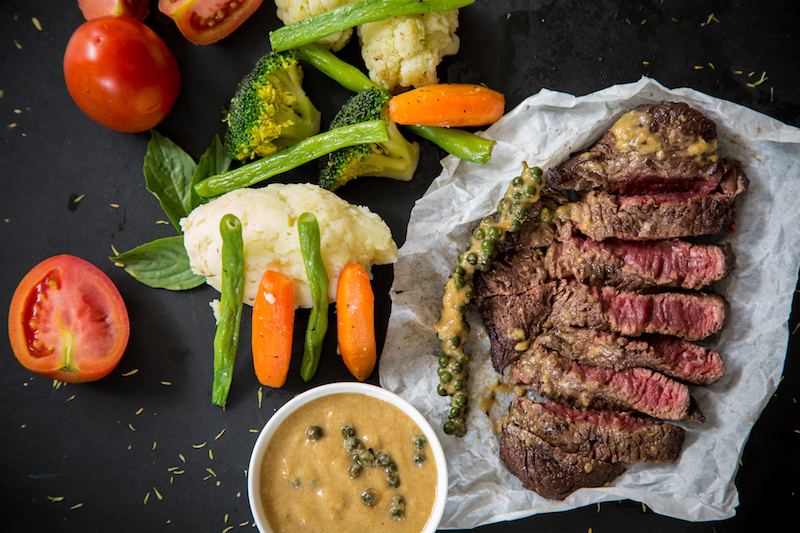If you’re sedentary and trying to lose weight, there’s a case to be made for limiting carbohydrate intake and increasing fat. But if you exercise regularly, and especially if you’re interested in gaining muscle then high carb diets are usually on the menu, with most recommendations suggesting at least two grams of carbs per pound of bodyweight every day. And when it comes to macronutrients, increasing carbs usually involves reducing fat.
Low fat diets had their heyday in the 1980s and many feel they’re outdated. So how much fat is ideal and what’s an acceptable limit if you’re trying to increase your overall carbohydrate and calorie intake?
We’ve spoken to a weight loss-focused physician and looked at the scientific literature to answer these questions.
What Is a Low Fat Diet?
Is Low Fat, High Carb Best for Gaining Muscle?
Is Low Fat or Low Carb Best for Weight Loss?
Should I Cycle Fat Intake?
Editor’s note: The content on BarBend is meant to be informative in nature, but it should not be taken as medical advice. The opinions and articles on this site are not intended for use as diagnosis, prevention, and/or treatment of health problems.
What Is a Low Fat Diet?
- Low fat diets have 20 to 35 percent of calories coming from fat
- Very low fat diets have under 10 percent of the calories from dat
The World Health Organization, American Heart Association, and the USDA’s dietary reference intakes recommend that no more than 20 to 35 percent of your total daily calories come from fat.(1) Let’s say you weigh 180 pounds and you eat 2,500 calories per day: that’s 500 to 875 calories from fat or 55 to 97 grams.
Protein intake is controversial, but most athletes would eat about 0.8 to 1 gram of protein per pound of bodyweight, so this would bring you to 144 to 180 grams of protein. That’s 576 to 720 calories or 23 to 29 percent of your total calories.
This would leave roughly 1,116 calories from carbs, or 279 grams. (About 45 percent of your total calories.) So that would look like:
Total Calories: 2,500
Protein: 648 calories (162 grams)
Carbs: 1,116 calories (279 grams)
Fat: 688 calories (76 grams)
At about 27 percent of the total calories, this fits the definition of a low fat diet.
However, athletes are frequently recommended to consume a ratio of protein and carbs at 1:2 or 1:3. Let’s say you’re shooting for a ratio of 1:2.5, that would put your macros more like this:
Total Calories: 2,500
Protein: 648 calories (162 grams)
Carbs: 1,620 calories (405 grams)
Fat: 232 calories (26 grams)
This puts fat at a little under 10 percent of the daily calories, which would meet the standard definition of a Very Low Fat diet.(1) For elite athletes, some experts recommend considerably more carbs.
“According to an expert panel, the daily carbohydrate needs of the serious competitor, someone who may train for four hours a day or more, was cited to be about 12 grams per kilogram of bodyweight,” says Dr. Aastha Kalra, a New York-based physician.(2)
For such high levels of exercise, the 180-pound person would probably be eating at least 3,500 calories per day, but fat intake would still be quite low.
Is this a smart approach? Is it enough fat to maintain your health and help you gain muscle?
Is Low Fat, High Carb Best for Gaining Muscle?
- Carbohydrates are critical for athletic performance
- They also increase insulin, which is anabolic
- Athletes may want to consider around 20 percent of their calories coming from fat
Carbs are critical for performance and if you want to compete at your best and gain functional muscle, the evidence is overwhelming: you need a lot of carbs.(3)
“Based on numerous pieces of research, carbohydrate is the substrate most efficiently metabolized by the body and the only macronutrient that can be broken down rapidly enough to provide energy during periods of high-intensity exercise when fast-twitch muscle fibers are primarily relied upon,” says Dr. Kalra. “The advantage of consuming carbs is they replenish glycogen stores, the depletion of which leads to performance decrements, particularly when strenuous exercise is performed on a regular basis.”
Not only that, but research has suggested that athletes on lower carb diets can not only experience reduced cognition, it may make them more susceptible to skeletal muscle damage.(2)
“A recent study of world-class race walkers who consumed a low-carbohydrate, high-fat diet for three weeks experienced a loss of exercise economy, resulted in a decrement in performance gains,” says Dr. Kalra. “There is also the concern for dehydration during exercise, which leads to reliance on carbohydrate for energy.”
So intentionally overfeeding carbs is a common practice among athletes looking to increase their skeletal muscle mass. Besides the fuel, an upside of all the extra carbohydrates is a surge in insulin, which is considered an anabolic hormone as insulin helps with protein metabolism and nutrient absorption.(4)
But what about fat intake? Fat is an essential nutrient. It’s a source of essential fatty acids, it provides energy, it helps you to absorb fat-soluble vitamins, and it helps to maintain hormonal health.(1) There’s evidence, for example, that polyunsaturated fats help to support healthy levels of testosterone, which is in turn linked to better body composition, mood, and athletic performance.(5)(6)
Therefore, it’s generally not recommended that athletes not sacrifice too much of their fat intake to keep their carbs high. To help with nutrient absorption and anabolism, the practice of keeping about 20 percent of your calories from fat remains a good rule of thumb for athletes.
To help with nutrient absorption and anabolism, the practice of keeping about 20 percent of your calories from fat remains a good rule of thumb for athletes.
That said, the ideal macronutrient balance varies from person to person; some feel and perform well on very low fat, others don’t. The key is to track your intake and modify based on how well you perform in and out of the gym.
[Thought low carb worked fine for athletes? Read our breakdown of ketogenic diets for strength training.]
Is Low Fat Ideal for Weight Loss?
- Research suggests both low fat and low carb work fine for weight loss
- Calorie balance is the most important factor
- The best diet is one you can stick to
If you want to lose fat, research is conflicting. It’s of the utmost importance to remember that the amount of calories you consume is far, far, far more important for losing or gaining weight than it is to manipulate your macronutrients.
Some studies have definitively concluded that when calories are equal, low fat wins for fat loss.(7) Others assert that low carb does a better job.(8)(9) Some say that low carb is worse for your overall health, others say that low fat will do more damage.(10)(11)
Perhaps the study that had the biggest impact on the debate was a very high quality randomized clinical trial published in late 2018.(12) It recruited over 600 healthy participants and monitored their food intake for a year, and found there was no difference in the amount of weight lost between low fat and low carb adherents. (Read more about this trial in our full breakdown here.)
“In this particular study, there can be a counterargument: in both the low carb and low fat groups, the key was to avoid sugar, flour and processed foods,” notes Dr. Kalra. “There have been several randomized controlled trials where there is benefit of low carb diet in people with metabolic derangements such as insulin resistance. This may not necessarily apply to athletes and bodybuilders.”
[If you’re looking to combine protein with micronutrients, check out our guide to the best meal replacements!]
For the general population, the rules are different. The average person is less likely to weigh their food and track their calories than an athlete, so it becomes a question of which diet is easiest to follow.
The average person is less likely to weigh their food and track their calories than an athlete, so it becomes a question of which diet is easiest to follow.
For athletes looking to lose weight, retain muscle, and maintain performance as much as possible, a good strategy may be to cycle calorie and carbohydrate intake according to their activity level.
Should I Cycle Fat Intake?
- Cycling calories and carbs may get the best of low carb and low fat diets
- Increase calories and carbs on workout days, reduce them on rest days
- Carb cycling may not be ideal for full time athletes
As we’ve seen, a high carbohydrate intake is key to athletic performance. The solution may be to alternate high carb and lower carb days depending on your level and intensity of exercise.
“Carb cycling is a better approach, in my opinion. One approach is to time carbs around exercise periods,” says Dr. Kalra. “Based upon the fact that fatigue during intense prolonged exercise is commonly due to depletion of muscle and liver glycogen which limits both training and competitive performance, a higher carbohydrate intake at times before, during and after exercise may help. The goal is to have as much carbohydrate in the body as possible during the latter stages of prolonged intense exercise when the ability for intense exercise usually becomes limiting to performance.”(13)
Generally, the athlete consumes more carbs and calories on workout days and restricts both on a rest day while increasing fat. This may help to confer many of the purported benefits of low carb diets like better insulin sensitivity and appetite control.(14)(15)(16)(17)
Say you consume 2,500 calories per day to stay at your current weight and you want to lose fat. A deficit of 3,500 calories per week is a manageable goal that can produce a pound of weight loss per week — if cycling calories, one would spread this deficit out over rest days and stay at maintenance on workout days. For gaining weight, one would put the excess calories and carbs on workout days and stay at maintenance on rest days.
That said, athletes who train hard six days per week may want to avoid reducing their carbs too much on rest days, as a consistently high intake may be ideal to facilitate recovery.
[For more on this strategy of “cycling” your carbs and fats, read our guide to carb cycling.]
Wrapping Up
Calorie balance reigns king for weight loss or weight gain, and it’s important to have enough of both carbohydrates and fat to maintain performance and overall health. Athletes need to track their micronutrients to stay healthy and stick to a macronutrient intake that works best with their individual body. Broadly, it’s considered ideal to get at least 20 percent of your calories from fat, but speak to a dietitian or a sports nutritionist to get a recommendation that’s tailored for your needs.
References
1. Liu AG, et al. A healthy approach to dietary fats: understanding the science and taking action to reduce consumer confusion. Nutr J. 2017 Aug 30;16(1):53.
2. Kanter M. High-Quality Carbohydrates and Physical Performance: Expert Panel Report. Nutr Today. 2018 Jan;53(1):35-39.
3. Burke LM, et al. Low carbohydrate, high fat diet impairs exercise economy and negates the performance benefit from intensified training in elite race walkers. J Physiol. 2017 May 1;595(9):2785-2807.
4. Dimitriadis G, et al. Insulin effects in muscle and adipose tissue. Diabetes Res Clin Pract. 2011 Aug;93 Suppl 1:S52-9.
5. Mumford SL, et al. Dietary fat intake and reproductive hormone concentrations and ovulation in regularly menstruating women. Am J Clin Nutr. 2016 Mar;103(3):868-77.
6. MInguez-Alarcón L, et al. Fatty acid intake in relation to reproductive hormones and testicular volume among young healthy men. Asian J Androl. 2017 Mar-Apr;19(2):184-190.
7. Hall KD, et al. Calorie for Calorie, Dietary Fat Restriction Results in More Body Fat Loss than Carbohydrate Restriction in People with Obesity. Cell Metab. 2015 Sep 1;22(3):427-36.
8. Volek J, et al. Comparison of energy-restricted very low-carbohydrate and low-fat diets on weight loss and body composition in overweight men and women. Nutr Metab (Lond). 2004 Nov 8;1(1):13.
9. Aude YW, et al. The national cholesterol education program diet vs a diet lower in carbohydrates and higher in protein and monounsaturated fat: a randomized trial. Arch Intern Med. 2004 Oct 25;164(19):2141-6.
10. Seidelmann SB, et al. Dietary carbohydrate intake and mortality: a prospective cohort study and meta-analysis. Lancet Public Health. 2018 Sep;3(9):e419-e428.
11. Dehghan M, et al. Associations of fats and carbohydrate intake with cardiovascular disease and mortality in 18 countries from five continents (PURE): a prospective cohort study. Lancet. 2017 Nov 4;390(10107):2050-2062.
12. Gardner CD, et al. Effect of Low-Fat vs Low-Carbohydrate Diet on 12-Month Weight Loss in Overweight Adults and the Association With Genotype Pattern or Insulin Secretion: The DIETFITS Randomized Clinical Trial. JAMA. 2018 Feb 20;319(7):667-679.
13. Coyle EF, et al. Timing and method of increased carbohydrate intake to cope with heavy training, competition and recovery. J Sports Sci. 1991 Summer;9 Spec No:29-51; discussion 51-2.
14. Dirlewanger M, et al. Effects of short-term carbohydrate or fat overfeeding on energy expenditure and plasma leptin concentrations in healthy female subjects. Int J Obes Relat Metab Disord. 2000 Nov;24(11):1413-8.
15. Poehlman ET, et al. Genotype dependency of the thermic effect of a meal and associated hormonal changes following short-term overfeeding. Metabolism. 1986 Jan;35(1):30-6.
16. Volek JS, et al. Rethinking fat as a fuel for endurance exercise. Eur J Sport Sci. 2015;15(1):13-20.
17. Kunces, L. et al. Effect of a very low carbohydrate diet followed by incremental increases in carbohydrate on respiratory exchange ratio (LB444). The FASEB Journal 2014 28:1_supplement







